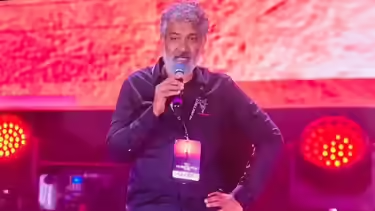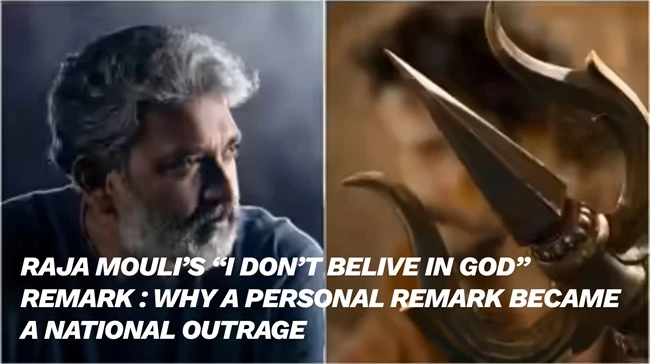In the Indian film industry, few names are as universally respected as S. S. Raja Mouli. His cinematic worldbuilding, his storytelling mastery and his ability to turn regional cinema into a global phenomenon have earned him unmatched admiration. For years, audiences celebrated him as a creative genius who carried culture, mythology and Indian pride to international platforms.
But a single remark—“I don’t believe in God”—has turned a beloved filmmaker into a subject of widespread criticism, trolling and heated online debate.
The question now is simple yet troubling: How did a personal belief become a national controversy?
This blog explores what happened, why the outrage escalated, what people are saying and why it’s important to step back and refocus on what really matters.

What Exactly Happened?
During an interview, Raja Mouli made a casual, honest and personal statement. When asked about his spiritual beliefs and how mythology influences his films, he simply said:
“I don’t believe in God.”
He wasn’t mocking religion, insulting any faith or attacking cultural sentiments. He was merely sharing his personal worldview—one that, like millions of Indians, exists alongside those who do believe in God.
But in today’s digital climate, where outrage often spreads faster than facts, the remark was clipped, circulated and amplified across social platforms. Context was lost. Narrative was twisted. What was an individual viewpoint suddenly became a supposed “attack on faith.”
Why the Remark Triggered Outrage
India is a deeply spiritual country and filmmakers who work with mythological themes are often expected to share the same beliefs. Raja Mouli’s body of work—from Baahubali to RRR—has strong cultural and emotional connections for audiences. Many assumed he must be a believer himself.
So when he openly shared that he does not follow or believe in religion, a section of viewers felt shocked and betrayed.
Some felt:
- A mythological filmmaker “should” believe in God
- He was distancing himself from the cultural roots that inspired his work
- He was dismissing the sentiment of millions of his fans
However, none of these assumptions came from what he said. They came from how people interpreted it.
What People Are Saying: A Look at Public Reaction
1. The Outrage Group
This section of the audience reacted strongly. Their comments include:
- “How can a man who created such divine epics say he doesn’t believe in God?”
- “He is insulting our culture.”
- “He should keep such views private.”
Most of these reactions stem from emotional attachment, not from facts.
2. The Supporters
There is also a large group defending him:
- “Belief is personal. His talent is independent of his faith.”
- “A filmmaker doesn’t have to follow the religion he portrays.”
- “Respect his honesty. At least he didn’t pretend for public approval.”
These voices highlight the need for respecting diversity of thought.
3. The Neutral Observers
Many people are questioning why this became an issue at all:
- “Why are we judging an artist based on his beliefs?”
- “Shouldn’t we focus on his contribution to Indian cinema instead?”
Their reactions show that while outrage is loud, it doesn’t represent everyone.
Why This Became Such a Big Issue
Several factors contributed to the sudden spike in criticism:
1. Sensitivity Around Faith
In India, belief is deeply tied to identity. Any deviation from popular belief often becomes controversial.
2. Social Media Amplification
Short clips removed from context spread easily, triggering mass misunderstanding.
3. Expectations from Public Figures
People assume celebrities must align with majoritarian beliefs to stay “acceptable.”
4. Mythology and Cinema Connection
Because Raja Mouli creates films rooted in cultural legends, some people expect him to follow the same faith.
But creativity isn’t confined by religion. Many global filmmakers who create faith-based stories do not necessarily follow the same religion.
Follow Us on Instagram and Youtube and Don’t Miss The Latest Updates.
Why a Personal Belief Should Not Define a Person’s Worth
One of the biggest concerns in situations like this is how quickly public perception shifts. A man celebrated for years can become a target overnight due to a single sentence.
But should personal belief overshadow decades of contribution?
Raja Mouli has:
- Elevated Indian cinema on the world stage
- Created stories loved across cultures
- Given thousands of people employment
- Brought pride to Indian filmmaking
None of this is diminished by his personal spiritual beliefs.
Art is not limited by what the artist believes. It thrives on imagination, empathy and creativity.
The Bigger Lesson: Why People Should Focus More on Their Own Work
This controversy reveals a deeper societal problem. We often:
- React more than we reflect
- Judge more than we understand
- Focus on opinions instead of achievements
- Spend time debating others’ personal choices instead of improving our own lives
Raja Mouli’s statement was about his belief, not about anyone else’s.
It wasn’t meant to influence, question or offend anyone.
If anything, this should remind us that:
- Everyone has the right to think differently
- Personal faith is private
- Creativity is independent of religious identity
- Growth comes from tolerance, not outrage
People who spend their time building, learning, improving and working rarely get distracted by such controversies. They understand that someone’s belief does not reduce their talent or their contribution.
A Personal View on This Entire Controversy
As an observer and admirer of cinema, it’s disappointing to see how quickly the narrative has turned. Instead of appreciating his honesty, many chose to attack it.
Everyone has the freedom to believe or not believe.
Everyone has the right to express their thoughts respectfully.
And everyone deserves the dignity to live without being judged for a personal opinion.
Raja Mouli has proven his excellence time and again. His films brought people together, regardless of religion, caste or background. If his art has never divided us, why should his belief?
This incident should be a wake-up call.
We need to learn to respect individual perspectives, even when we disagree.
Conclusion
The outrage around Raja Mouli’s “I don’t believe in God” statement reflects the growing intolerance toward differing personal views. But it also highlights the power of honesty and the need for society to evolve.
Instead of criticizing someone for their beliefs, we should focus on:
- Their work
- Their contribution
- Their values
- The positive impact they bring
Respecting diversity of thought is not just a sign of maturity—it’s essential for a creative and progressive society.
Raja Mouli remains one of the most talented filmmakers India has ever produced.
His belief doesn’t change that.
And it never should.
For Latest Updates on Indian Cinema , Please Follow Popnewsblend.com

Hi, I’m Prashant Jain — a curious soul, storyteller, and content creator at heart.I’ve always been drawn to the world of entertainment, travel, sports, health & lifestyle — not just as a writer, but as someone who genuinely lives these experiences. Whether I’m binge-watching the latest OTT series, exploring offbeat spiritual destinations in India, or diving deep into wellness routines and cricket match insights, I love sharing what I discover with like-minded readers.
PopNewsBlend is my way of blending personal journeys with meaningful stories — ones that inform, inspire, and keep you ahead of the curve. Everything I write comes from real observations, hands-on experiences, and a deep passion for understanding the world around us.
Discover more from Popnewsblend
Subscribe to get the latest posts sent to your email.







